Troutman, Smith Gambrell Protect Volunteer PPE-Makers From Legal Liability
Troutman lawyers created an emergency supply agreement so the Atlanta Opera can make N95 mask covers for Grady Hospital, and a Smith Gambrell lawyer provided a liability disclaimer for PPE that Atlanta Beats Covid is giving to first responders.
April 07, 2020 at 06:01 PM
6 minute read
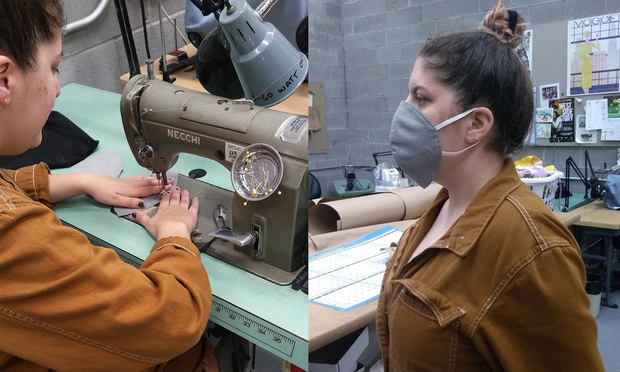 Lauren Allmeyer, The Atlanta Opera's assistant costume shop manager and wardrobe supervisor. (Courtesy photo)
Lauren Allmeyer, The Atlanta Opera's assistant costume shop manager and wardrobe supervisor. (Courtesy photo)
Amid a shortage of N95 masks and other critically needed personal protective equipment, Troutman Sanders and Smith Gambrell & Russell lawyers recently lent a hand to protect volunteer PPE-makers from regulatory and liability problems.
At Troutman, a team of lawyers crafted an emergency equipment agreement for the Atlanta Opera, which is providing Grady Memorial Hospital with thousands of covers for N95 masks that can be sterilized so the masks can be reused.
At Smith Gambrell, health care lawyer Susan Atkinson wrote a regulatory disclaimer for a new nonprofit, Atlanta Beats Covid, to accompany the face shields, ventilator masks and gowns that its network of volunteers is making for first responders.
While the pro bono efforts were quite different, both were important for the nonprofits, which could potentially be bankrupted by a suit after the coronavirus pandemic subsides.
Brett Tarver, a product liability associate, coordinated the Troutman effort to craft an agreement between the Atlanta Opera and Grady. The opera's performances are canceled at least through April, so its costume shop wanted to use the unexpected free time to help Grady's health care workers.
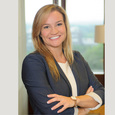 Brett Tarver
Brett TarverThe agreement came together fast, Tarver said. On March 22, Tarver, who is on the Atlanta Symphony Orchestra's board, received an email from another symphony board member, Howard Palefsky, who is also on the opera's board, asking if she could provide legal guidance for the mask-cover makers.
By noon the next day, the opera's costume shop had received instructions from Grady on how to make the covers and was working on prototypes, Tarver said, "while we hashed out the liability and regulatory issues to get the written agreement squared away with Grady."
Victoria Alvarez, a litigation associate in Charlotte, North Carolina, wrote the emergency supplies agreement that week with input from other Troutman lawyers—and some from Pepper Hamilton as well. (The two firms plan to merge July 1.)
"We looked to protect the opera on all fronts by identifying and providing liability and regulatory enforcement protections," Tarver said. "The opera is not seeking FDA approval to manufacture a medical device, so we needed to make sure they were protected from potential regulatory enforcement."
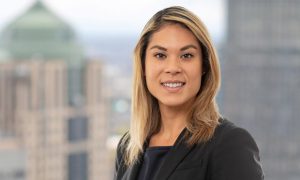 Victoria Alvarez
Victoria AlvarezAlvarez said the other focus was to protect the opera from future liabilities. "I never thought I would write an agreement that opens by citing the Stafford Act and a global pandemic, but everything about this is unique," Alvarez said, referring to the federal law that allows the president to declare a national emergency.
"Contracts aren't written for right now. They're written for the future," she added. "Right now there is lots of goodwill, but in the future some may forget that goodwill and look for someone to blame."
Among others, Troutman partners Robert Browne in Chicago provided guidance on FDA regulations, and Brandon Wood in Charlotte provided contracts input.
Charlie Sharbaugh of Carlton Fields, who is also on the opera and symphony boards, enlisted insurance coverage lawyers at his firm to address the insurance aspect. "We wanted to make sure that Grady's insurance coverage provided indemnification for any potential issues," Alvarez explained.
"It was incredible to be able to iron out all these details covering various different legal and liability issues, write it and get agreement on both sides so quickly," Alvarez said.
The Atlanta Opera is currently making about 125 mask covers per day for Grady, with a goal of 72,000, Tarver said.
Smith Gambrell and PPE
At Smith Gambrell, Atkinson wrote a disclaimer as a package insert for the face shields and other items Atlanta Beats Covid has been making so that the small nonprofit, which formed March 20, could donate them to police, ambulance workers and other first responders without risking liability.
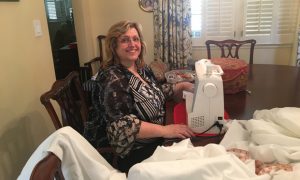 Susan Atkinson
Susan AtkinsonLee Whitcher, an engineering graduate student at Georgia Tech, started Atlanta Beats Covid under the auspices of an existing nonprofit, Decatur Makers. A board member from that group, Doug Wetzel, connected with Smith Gambrell, where he'd been a client.
The group delivered its first batch of 200 face shields to Metro Atlanta Ambulance Services at the end of March, Wetzel said, and last week they delivered another batch to the Cobb County Police Department.
The Coca-Cola Co. is donating the plastic to make thousands of the shields, Wetzel said, which Whitcher and other Georgia Tech engineers are producing with 3-D printers. The Georgia Tech engineers also are working on ventilator masks using a 3-D-printed mold for silicon respirators, while other members of the metro Atlanta collective are sewing cloth masks and gowns.
Since the nonprofit was making no claims that the PPE is certified by the FDA or other regulatory agencies as medical equipment, Atkinson said it was important that the disclaimer specify precisely what the group was doing.
"It's a volunteer project to help with the COVID-19 crisis, and they're not holding out their equipment as meeting any medical standard, so whomever accepts it is responsible to explain to employees that it is not medical grade," per the disclaimer, the health care lawyer said.
Meanwhile, Atkinson said, her regular health care practice became entirely devoted to COVID-19 issues about three weeks ago.
A Smith Gambrell client that makes sports jerseys is now producing protective gowns, so Atkinson determined the regulatory requirements and is writing agreements for recipients. Other clients also have questions about producing critically needed PPE that is not FDA-certified.
And, she said, doctor clients have been asking what they should tell their employees about wearing masks in the office—and when they can or cannot furlough employees.
"Everybody's trying to make this work," she said.
NOT FOR REPRINT
© 2025 ALM Global, LLC, All Rights Reserved. Request academic re-use from www.copyright.com. All other uses, submit a request to [email protected]. For more information visit Asset & Logo Licensing.
You Might Like
View All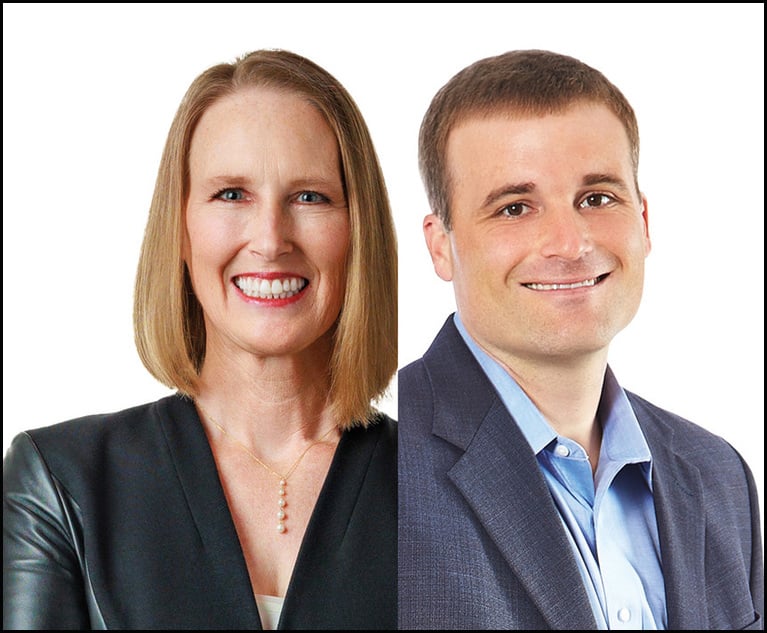

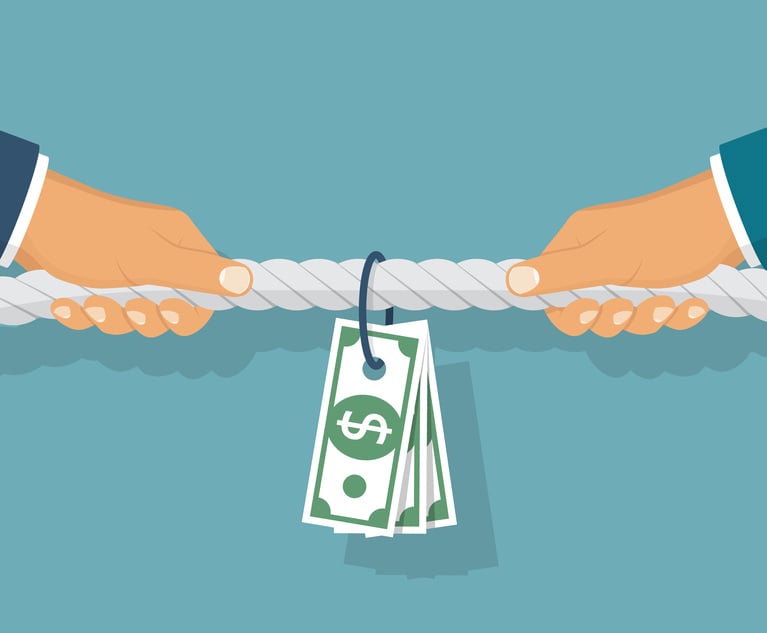

Alston & Bird, Baker Hostetler, Holland & Knight Promote Partners in Southeast
5 minute readLaw Firms Mentioned
Trending Stories
- 1Supreme Court Takes Up Challenge to ACA Task Force
- 2'Tragedy of Unspeakable Proportions:' Could Edison, DWP, Face Lawsuits Over LA Wildfires?
- 3Meta Pulls Plug on DEI Programs
- 4On the Move and After Hours: Meyner and Landis; Cooper Levenson; Ogletree Deakins; Saiber
- 5State Budget Proposal Includes More Money for Courts—for Now
Who Got The Work
Michael G. Bongiorno, Andrew Scott Dulberg and Elizabeth E. Driscoll from Wilmer Cutler Pickering Hale and Dorr have stepped in to represent Symbotic Inc., an A.I.-enabled technology platform that focuses on increasing supply chain efficiency, and other defendants in a pending shareholder derivative lawsuit. The case, filed Oct. 2 in Massachusetts District Court by the Brown Law Firm on behalf of Stephen Austen, accuses certain officers and directors of misleading investors in regard to Symbotic's potential for margin growth by failing to disclose that the company was not equipped to timely deploy its systems or manage expenses through project delays. The case, assigned to U.S. District Judge Nathaniel M. Gorton, is 1:24-cv-12522, Austen v. Cohen et al.
Who Got The Work
Edmund Polubinski and Marie Killmond of Davis Polk & Wardwell have entered appearances for data platform software development company MongoDB and other defendants in a pending shareholder derivative lawsuit. The action, filed Oct. 7 in New York Southern District Court by the Brown Law Firm, accuses the company's directors and/or officers of falsely expressing confidence in the company’s restructuring of its sales incentive plan and downplaying the severity of decreases in its upfront commitments. The case is 1:24-cv-07594, Roy v. Ittycheria et al.
Who Got The Work
Amy O. Bruchs and Kurt F. Ellison of Michael Best & Friedrich have entered appearances for Epic Systems Corp. in a pending employment discrimination lawsuit. The suit was filed Sept. 7 in Wisconsin Western District Court by Levine Eisberner LLC and Siri & Glimstad on behalf of a project manager who claims that he was wrongfully terminated after applying for a religious exemption to the defendant's COVID-19 vaccine mandate. The case, assigned to U.S. Magistrate Judge Anita Marie Boor, is 3:24-cv-00630, Secker, Nathan v. Epic Systems Corporation.
Who Got The Work
David X. Sullivan, Thomas J. Finn and Gregory A. Hall from McCarter & English have entered appearances for Sunrun Installation Services in a pending civil rights lawsuit. The complaint was filed Sept. 4 in Connecticut District Court by attorney Robert M. Berke on behalf of former employee George Edward Steins, who was arrested and charged with employing an unregistered home improvement salesperson. The complaint alleges that had Sunrun informed the Connecticut Department of Consumer Protection that the plaintiff's employment had ended in 2017 and that he no longer held Sunrun's home improvement contractor license, he would not have been hit with charges, which were dismissed in May 2024. The case, assigned to U.S. District Judge Jeffrey A. Meyer, is 3:24-cv-01423, Steins v. Sunrun, Inc. et al.
Who Got The Work
Greenberg Traurig shareholder Joshua L. Raskin has entered an appearance for boohoo.com UK Ltd. in a pending patent infringement lawsuit. The suit, filed Sept. 3 in Texas Eastern District Court by Rozier Hardt McDonough on behalf of Alto Dynamics, asserts five patents related to an online shopping platform. The case, assigned to U.S. District Judge Rodney Gilstrap, is 2:24-cv-00719, Alto Dynamics, LLC v. boohoo.com UK Limited.
Featured Firms
Law Offices of Gary Martin Hays & Associates, P.C.
(470) 294-1674
Law Offices of Mark E. Salomone
(857) 444-6468
Smith & Hassler
(713) 739-1250






